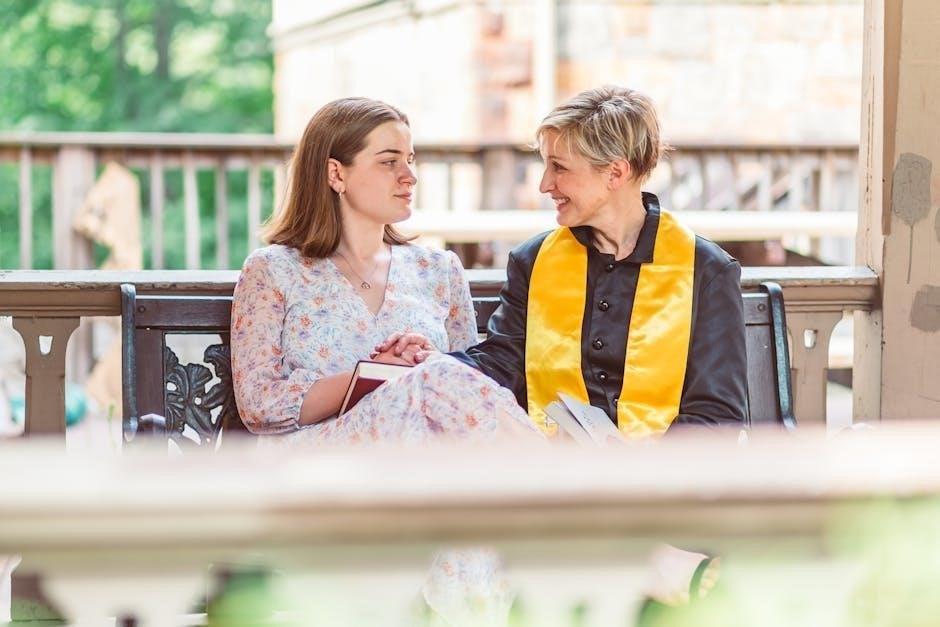Bridging the gap between Black men and women, this guide explores historical challenges, societal expectations, and fostering deeper connections through mutual understanding and respect.
1.1 The Importance of Mutual Understanding in Relationships
Mutual understanding is the cornerstone of any thriving relationship, particularly between Black men and women. It fosters empathy, respect, and trust, which are essential for navigating challenges. By actively listening and seeking to comprehend each other’s experiences, both partners can bridge gaps created by societal stereotypes and historical biases. Understanding each other’s perspectives allows for healthier communication and a stronger emotional connection. It also promotes a supportive environment where both individuals feel valued and heard. In the context of Black relationships, mutual understanding helps dismantle misunderstandings rooted in cultural and historical differences, paving the way for a more harmonious and equitable partnership.
1.2 Historical Context of Black Relationships
Understanding the historical context of Black relationships is crucial for fostering mutual respect and empathy. The legacy of slavery, Jim Crow laws, and systemic racism has deeply influenced the dynamics between Black men and women. These oppressive systems disrupted families, enforced gender roles, and created societal expectations that still resonate today. The Superwoman Schema, rooted in resilience, often places undue burdens on Black women to be strong caregivers. Historical trauma has also shaped communication styles and trust issues. Recognizing this history helps in addressing the unique challenges Black couples face, fostering a deeper appreciation for their collective strength and resilience. This context is vital for building healthier, more supportive relationships.
1.3 The Purpose of This Guide
This guide aims to bridge the understanding gap between Black men and Black women, fostering mutual respect and empathy. By exploring cultural, historical, and social dynamics, it provides insights into the unique challenges Black women face. The guide encourages open dialogue, emotional intelligence, and shared values to strengthen relationships. It serves as a resource for Black men seeking to support their partners better, promoting a deeper connection. Through education and awareness, this guide helps dismantle stereotypes and build healthier partnerships, ultimately fostering unity and understanding within the Black community. By addressing these aspects, it lays the foundation for more compassionate and resilient relationships. The guide is a tool for personal growth and collective empowerment.

Cultural and Historical Context
Exploring the rich heritage and historical challenges faced by Black women, this section delves into cultural identity, societal expectations, and the legacy of systemic oppression, shaping their experiences today.
2.1 The Superwoman Schema and Its Impact
The Superwoman Schema, a concept rooted in resilience, describes Black women’s tendency to excel in multiple roles—caretaker, provider, and community leader—while suppressing vulnerability. This unrealistic expectation fosters mental strain, as balancing these roles without support often leads to emotional exhaustion and burnout. Historically, Black women have been expected to endure hardship silently, perpetuating the notion of invincibility. This schema, while a testament to their strength, can hinder their ability to seek help or express emotional pain, further isolating them. Understanding this dynamic is crucial for fostering empathy and building healthier, more supportive relationships.
2.2 Intersectionality and Its Role in Shaping Black Women’s Experiences
Intersectionality, a term coined by Kimberlé Crenshaw, highlights how overlapping systems of oppression—racism, sexism, and classism—create unique challenges for Black women. These intersecting identities amplify their marginalization, often leading to exclusion from resources and opportunities. Black women face distinct experiences compared to both white women and Black men, as they encounter race and gender biases simultaneously. Understanding intersectionality allows Black men to recognize how societal structures disproportionately affect Black women, fostering empathy and solidarity. It challenges them to confront their own privileges and actively support Black women in dismantling these oppressive systems, ultimately promoting a more equitable and inclusive environment for all.
2.3 The Legacy of Jim Crow Laws on Black Relationships
Jim Crow laws, enacted between 1877 and the mid-1960s, institutionalized racial segregation and inequality, profoundly impacting Black relationships. These laws enforced separation in public spaces, limited economic opportunities, and fostered an environment of fear and mistrust. Black families faced immense challenges, including restricted access to education, employment, and healthcare, which strained relationships and limited social mobility. The psychological trauma from systemic racism and violence further affected dynamics, creating intergenerational scars. Understanding this legacy helps Black men appreciate the resilience of Black women and the collective strength required to overcome historical injustices, fostering a deeper connection and mutual support in modern relationships.

Communication and Emotional Intelligence
Effective communication and emotional intelligence are vital for understanding Black women. Active listening, clarity, and empathy foster trust, while recognizing cultural nuances enhances connection and mutual respect.
3.1 Active Listening as a Tool for Understanding
Active listening is a cornerstone of effective communication, enabling deeper understanding of Black women’s perspectives. It involves fully engaging with their words, tone, and body language, without interruption or judgment. This practice fosters trust and validation, allowing Black women to feel heard and valued. By maintaining eye contact, nodding, and using verbal cues like “I see” or “Go on,” one demonstrates genuine interest. Reflective listening, where responses paraphrase or summarize what was said, ensures clarity and shows empathy. Avoiding assumptions and focusing on the speaker’s message rather than preparing a reply is crucial. This approach helps bridge gaps, resolves misunderstandings, and strengthens emotional connections, fostering mutual respect and understanding in relationships.
3.2 The Role of Emotional Expression in Relationships
Emotional expression plays a vital role in fostering intimacy and trust in relationships. For Black women, who often face societal pressures to suppress emotions due to stereotypes like the “Strong Black Woman,” being able to express feelings freely is liberating. Open dialogue about emotions strengthens bonds and creates a supportive environment. Encouraging vulnerability allows both partners to connect on a deeper level, fostering empathy and understanding. By validating each other’s feelings, couples can navigate challenges collaboratively. Emotional expression is not a sign of weakness but a testament to mutual respect and trust, essential for building resilient and meaningful relationships.
3.3 Navigating Differences in Communication Styles

Communication styles can vary significantly between individuals, influenced by cultural, personal, and societal factors. Understanding these differences is crucial for fostering harmony in relationships. Black women may express themselves assertively, often shaped by resilience and societal expectations, while their partners may have different approaches. Active listening and empathy are key to bridging these gaps. Adapting communication styles to align with each other’s needs promotes mutual understanding. Recognizing that differences are not weaknesses but opportunities for growth can strengthen the bond. Open dialogue about communication preferences ensures both partners feel heard and valued, fostering a deeper connection and a more supportive relationship dynamic.

Understanding Black Women’s Challenges
Black women face unique struggles, including racism, misogynoir, and societal expectations, which impact their mental health and relationships. Recognizing these challenges fosters empathy and support.
4.1 The Impact of Racism on Black Women’s Mental Health
Systemic racism significantly affects Black women’s mental health, leading to heightened stress, anxiety, and depression. The constant exposure to racial discrimination creates emotional burdens, often resulting in internalized racism and feelings of inadequacy. These experiences can manifest as post-traumatic stress disorder (PTSD) symptoms, particularly in environments where Black women face microaggressions and overt racism. Additionally, societal expectations and stereotypes, such as the “Strong Black Woman” trope, can exacerbate mental health challenges by discouraging vulnerability and help-seeking behaviors. Understanding these struggles is crucial for fostering empathy and providing the necessary support to combat the long-term effects of racism on Black women’s well-being and relationships.
4.2 The Effects of Misogynoir in Society
Misogynoir, the intersection of racism and sexism, uniquely impacts Black women, perpetuating harmful stereotypes and systemic oppression. It leads to hyper-sexualization, objectification, and the erasure of Black women’s voices. Misogynoir fosters environments where Black women are marginalized, excluded, and invalidated. This societal issue contributes to mental health challenges, as Black women face constant invalidation of their experiences. It also perpetuates cycles of discrimination in workplaces, media, and relationships. Addressing misogynoir requires recognizing its pervasive effects and actively challenging these biases to create equitable spaces for Black women to thrive and be valued. Understanding and dismantling misogynoir is essential for fostering inclusive and supportive communities.
4.3 The Strong Black Woman Stereotype
The Strong Black Woman (SBW) stereotype portrays Black women as resilient, self-sacrificing, and emotionally impenetrable. While seemingly positive, it denies vulnerability and perpetuates unrealistic expectations. Black women are often expected to endure hardships silently, reinforcing emotional suppression. This stereotype can lead to mental health challenges, as seeking help is discouraged, and societal pressures to conform mount. It also strains relationships, as partners may overlook their emotional needs. Understanding the SBW stereotype involves recognizing its historical roots and the burden it places on Black women. Challenging this narrative allows for authentic expression and support, fostering healthier, more balanced relationships. Embracing vulnerability can lead to true strength and connection.

Building Mutual Respect
Fostering mutual respect involves acknowledging Black women’s contributions, valuing their perspectives, and creating a supportive environment. Open communication and shared values strengthen trust and understanding, leading to harmony in relationships.
5.1 Recognizing and Appreciating Black Women’s Contributions
Recognizing Black women’s contributions is vital for building mutual respect. Their roles as caregivers, professionals, and community leaders often go unnoticed. Acknowledging their strength and resilience fosters appreciation and strengthens relationships. By valuing their efforts, we create a supportive environment where their voices are heard and respected. This recognition not only honors their achievements but also encourages open dialogue and collaboration. Understanding their multifaceted roles helps in appreciating their unique perspectives, which are essential for fostering a deeper connection and mutual respect.
5.2 The Importance of Shared Values in Relationships
Shared values form the foundation of strong, enduring relationships between Black men and women. Common principles such as respect, trust, and commitment create a bond that fosters understanding and unity. When both partners align on core values, communication becomes more effective, reducing misunderstandings. These shared beliefs act as a guiding force, helping navigate challenges and strengthen the relationship. Additionally, shared values promote mutual respect and appreciation, which are crucial for building a supportive and harmonious partnership. By prioritizing these shared principles, relationships can grow deeper and more resilient, creating a solid base for long-term success and mutual growth.
5.3 Addressing Power Dynamics in Relationships
Addressing power dynamics is crucial for fostering equality and mutual respect in relationships. Historical and societal factors, such as misogynoir and systemic oppression, often influence these dynamics, creating imbalances. Open communication and shared decision-making help ensure both partners feel valued and heard. Recognizing and challenging harmful stereotypes, like the “strong Black woman” trope, fosters a more balanced partnership. By acknowledging these power imbalances and working together to dismantle them, relationships can grow stronger and more equitable. Mutual respect and a willingness to adapt are key to building a relationship where both individuals thrive, free from oppressive structures.

The Role of Support Systems
Support systems are vital for fostering resilience and unity. Creating a nurturing environment through open dialogue and community engagement strengthens relationships and promotes mutual understanding and growth;
6.1 Creating a Supportive Environment for Black Women
Creating a supportive environment involves acknowledging and addressing the unique challenges Black women face. By fostering open communication and active listening, individuals can build trust and understanding. It’s crucial to recognize the historical and societal barriers that contribute to these challenges, such as systemic racism and misogynoir. Education and awareness are key components in dismantling these barriers. Encouraging dialogue about these issues helps to create a space where Black women feel valued and heard. Additionally, promoting shared resilience and unity within the community strengthens relationships and fosters personal and collective growth. This supportive environment is essential for building healthy and meaningful connections.
6.2 The Role of Community in Strengthening Relationships
The community plays a vital role in strengthening relationships by providing a shared sense of identity and support. Collectively, individuals can address challenges and celebrate successes, fostering resilience. A united front within the community promotes understanding and mutual respect, which are foundational for healthy relationships. Cultural values and traditions, passed down through generations, further enrich these bonds. Community events and social activities create opportunities for connection, while shared goals and aspirations inspire collaboration. By leaning on one another, individuals within the community can navigate life’s complexities with greater ease. This collective support system not only strengthens relationships but also contributes to the overall well-being of the community.
6.3 Encouraging Open Dialogue About Challenges
Open dialogue is essential for addressing challenges in relationships, fostering understanding and mutual respect. By creating a safe space for honest communication, both partners can express their feelings and concerns without fear of judgment. Active listening and empathy are crucial in this process, allowing each individual to feel heard and valued. Acknowledging the unique experiences of Black women, such as the impact of racism and societal expectations, can deepen the conversation. Encouraging open dialogue helps to break down barriers and build trust, enabling both individuals to work collaboratively toward solutions. This proactive approach not only strengthens the relationship but also promotes personal growth and unity.

Navigating Differences and Conflicts
Navigating differences requires empathy, understanding, and effective communication to resolve conflicts. Mutual respect and effort are key to building a harmonious relationship.
7.1 Understanding and Respecting Different Perspectives
Understanding different viewpoints is crucial in any relationship, especially between Black men and women. Recognizing each other’s experiences fosters empathy and mutual respect. By actively listening and acknowledging individual perspectives, both partners can create a safe space for open dialogue. This not only strengthens trust but also allows for a deeper connection. Respecting differing opinions helps in navigating conflicts and building a foundation of understanding. It’s about valuing each other’s uniqueness and experiences, which enriches the relationship and promotes harmony. This approach ensures that both individuals feel heard and respected, leading to a more balanced and fulfilling partnership.
7.2 Conflict Resolution Strategies in Relationships
Effective conflict resolution is essential for maintaining healthy relationships. Open communication, active listening, and empathy are key strategies to address disagreements constructively. Remaining calm and avoiding defensive behavior helps prevent escalation. Using “I” statements instead of “you” statements can reduce blame and promote understanding. Seeking solutions collaboratively fosters mutual respect and strengthens trust. Understanding each other’s perspectives and validating feelings can bridge gaps. Conflict resolution isn’t about winning but about growing together. By addressing issues thoughtfully and respectfully, couples can navigate challenges and emerge stronger. These strategies require patience, commitment, and a willingness to compromise, ultimately leading to a more harmonious and resilient relationship.
7.3 The Role of Forgiveness in Building Trust
Forgiveness plays a crucial role in building and maintaining trust within relationships. It involves letting go of resentment and anger, not for the other person, but for personal healing. Trust is strengthened when both partners demonstrate accountability and a willingness to grow from past mistakes. Forgiveness doesn’t mean forgetting or excusing hurtful behavior but rather releasing negative emotions to create space for healing. Consistency in actions and words builds credibility, which is essential for trust. Open communication about past hurts and a commitment to change fosters a safe and supportive environment. Without forgiveness, unresolved issues can fester, damaging the foundation of the relationship. Forgiveness, paired with accountability, is key to nurturing trust and fostering a resilient bond.

The Importance of Education and Awareness
Education bridges understanding, dispelling stereotypes and misconceptions. Literature and media provide insights into Black women’s experiences, fostering empathy and awareness essential for meaningful connections.
8.1 Educating Oneself About Black Women’s Experiences
Educating oneself about Black women’s experiences is crucial for fostering understanding and empathy. Literature, research, and personal narratives provide insights into the challenges they face. By exploring historical contexts, such as the impact of Jim Crow laws and intersectionality, one gains a deeper appreciation for their resilience. Misogynoir and the Strong Black Woman stereotype are key topics to study. Engaging with these materials helps break down stereotypes and promotes mutual respect. It’s essential to approach this education with an open mind, acknowledging the complexities of their experiences. This knowledge lays the foundation for healthier, more supportive relationships.
8.2 The Role of Literature in Understanding Black Women
Literature plays a vital role in understanding Black women’s experiences by providing profound insights into their lives and challenges. Works by authors like Patricia Hill Collins offer frameworks for analyzing intersectionality and the societal structures affecting Black women. Books such as The Blackwoman’s Guide to Understanding the Blackman by Shahrazad Ali explore dynamics within relationships, while other texts delve into the Superwoman Schema and misogynoir; These narratives highlight resilience, cultural richness, and the struggles of navigating racism and sexism. By engaging with these writings, one gains empathy and a deeper appreciation for the complexities of Black women’s identities. Literature serves as both a mirror to the past and a blueprint for fostering understanding and respect.
8.3 The Impact of Media on Perceptions of Black Women
Media significantly shapes perceptions of Black women, often perpetuating stereotypes or limiting their representation. While some platforms highlight their strength and resilience, others reduce them to tropes like the “Strong Black Woman” or hypersexualized caricatures. These portrayals influence societal attitudes, reinforcing biases and misconceptions. Conversely, diverse and authentic depictions in media can challenge stereotypes, fostering greater understanding and empathy. Critical consumption of media is essential to discern harmful narratives and appreciate accurate representations. By promoting balanced portrayals, media can play a role in dismantling misconceptions and celebrating the complexity of Black women’s lives. This requires intentional efforts to amplify their voices and stories authentically.

Personal Growth and Development
Self-reflection, emotional intelligence, and accountability are key to fostering healthier relationships and deeper understanding, enabling growth and stronger connections between Black men and women.
9;1 The Role of Self-Reflection in Understanding Others
Self-reflection is a powerful tool for gaining insight into one’s own biases and assumptions, which is crucial for understanding others. By examining personal beliefs and experiences, individuals can identify how these factors influence their perceptions of Black women. This process involves introspection, acknowledging past mistakes, and being open to change. Through self-reflection, Black men can better recognize the societal challenges Black women face, such as racism and misogynoir, fostering empathy and mutual respect. Regular self-reflection promotes personal growth and healthier relationships, as it encourages a deeper understanding of the complexities of Black women’s experiences and the importance of supportive partnerships.
9.2 The Importance of Emotional Intelligence for Black Men
Emotional intelligence (EI) is crucial for Black men seeking to understand and connect with Black women. EI involves self-awareness, empathy, and effective communication, which are essential for navigating the complexities of relationships. By understanding and managing their own emotions, Black men can better recognize and respond to the emotional experiences of Black women. This fosters deeper empathy and mutual respect. High EI also helps in addressing conflicts constructively and creating a safe, supportive environment. Cultivating emotional intelligence allows Black men to move beyond stereotypes and societal expectations, enabling them to engage more meaningfully with Black women’s unique challenges and strengths.
9.3 The Role of Accountability in Building Healthy Relationships
Accountability is a cornerstone of healthy relationships, fostering trust and respect between Black men and women. It involves taking responsibility for one’s actions, being transparent, and acknowledging mistakes. By holding oneself accountable, individuals demonstrate commitment to growth and understanding. This is particularly vital in addressing the unique challenges Black women face, such as racism and misogyny. Accountability encourages personal reflection and proactive steps to dismantle harmful stereotypes. It also promotes mutual respect and empathy, creating a foundation for stronger, more equitable relationships. Through accountability, Black men can actively contribute to a supportive environment, fostering deeper connections and shared growth.
10.1 Summarizing Key Takeaways
Key takeaways emphasize the importance of mutual respect, empathy, and understanding in fostering healthier relationships. Recognizing historical and systemic barriers faced by Black women is crucial. Open communication, emotional intelligence, and addressing power dynamics are essential tools. Education and self-reflection play significant roles in dismantling stereotypes and biases. Building trust through accountability and forgiveness strengthens connections. Leveraging community support and shared values can enhance resilience. Ultimately, the journey toward deeper understanding requires continuous effort and a commitment to growth, ensuring a future where Black relationships thrive through unity and mutual appreciation.
10.2 The Path to a Deeper Understanding
The path to a deeper understanding involves fostering empathy, embracing vulnerability, and actively listening to Black women’s experiences. It requires dismantling ingrained stereotypes and recognizing the intersectional challenges they face. Education through literature and open dialogue can illuminate their unique struggles. Encouraging shared spaces for honest conversations and mutual learning is vital. By acknowledging the historical and societal barriers, Black men can become allies in fostering resilience and unity. This journey demands patience, humility, and a willingness to grow together, ultimately leading to stronger, more meaningful relationships built on trust, respect, and a shared vision for the future.
10.3 The Future of Black Relationships
The future of Black relationships lies in fostering unity, mutual respect, and a shared commitment to growth. By addressing historical wounds and embracing cultural pride, Black men and women can build stronger bonds. Education and open dialogue are key to breaking down stereotypes and fostering empathy. Encouraging mutual support systems and celebrating shared achievements will strengthen connections. Both partners must take responsibility for understanding each other’s challenges and aspirations. The path forward requires patience, humility, and a willingness to evolve together. By prioritizing love, respect, and unity, Black relationships can thrive, creating a legacy of resilience and harmony for future generations. The future is bright when grounded in understanding and mutual appreciation.
